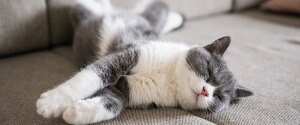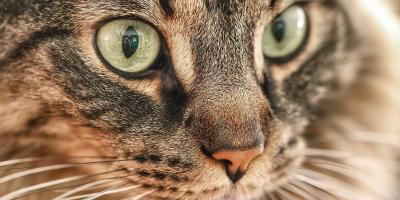
If you've owned a cat for a while, you already know that they spend the vast majority of their time sleeping. On a normal day, a cat spends about 15 hours sleeping, but cats who are very tired or who have been under large amounts of stress can sleep for up to a full 24 hours.
Considering all that sleep time they're logging, you might reasonably wonder whether your cat is also dreaming. Do cats dream and, if so, what do cats dream about? Read on to find out.
Can Cats Dream?
While we can't be sure that cats dream since we can't ask them directly, research has found that it's extremely likely that cats do experience dreams during their sleep cycle.
Sleep cycles have two main phases: REM sleep and deep sleep. During a cat's deep sleep stage, their body rebuilds and repairs itself; the same is true for humans.
The rapid eye movement (REM) phase is when dreaming activity happens. In the 1960s, researcher Michel Jouvet discovered that cats also experience this sleep stage. During REM sleep, you may see your cat twitch, squeak or make other noises that indicate they could be dreaming.
The older your cat is, the less time they spend in REM sleep. This means that you may notice that your cat doesn't twitch as much in their sleep as they did when they were a kitten. The reason for this is that REM sleep is when information from the day is processed in the brain. Because kittens are learning so much about their environments all at once, they need more time to process that information than a senior cat who's been living more or less the same life for several years.
One important point to note: It's not a good idea to wake a sleeping cat. Your cat isn't sleeping because they are lazy. Important work in your cat's body and brain happens during sleep, and if you wake them up, you can disrupt this process. Make sure to give your cat a comfy and secure place so they can get the rest they need.
What Do Cats Dream About?
Assuming cats do dream, what do they dream about? Again, we can't know for sure, but we can take our cues from the movements cats make during their sleep. For example, you may have noticed your cat moving their head in their sleep as if they're watching something or following it with their eyes. This could mean that cats dream about hunting, catching prey or playing with their favourite toys.
Some research has also suggested that cats may dream about things that happened during that previous day or in the past. Your cat may be dreaming about cuddling next to you on the couch, batting a ball of foil or playing with your other pets.
It also seems possible that cats may be able to have nightmares as well. Extensive research hasn't been done on this topic yet, but it stands to reason that cats could have bad dreams just as humans do if they can dream at all. Some people have also noted that their cats may make stressed sounds while they're asleep or that they wake up looking agitated, which could be signs of nightmares.
Why Is My Cat Twitching While Sleeping?
One common behaviour that people notice about their sleeping cats is that they still move around a lot when they're sleeping. As mentioned above, this could be because they're dreaming about moving in the REM stage and those movements are being partially manifested in real life. For example, if your cat is hunting a mouse in their dreams, you might see their tail and paws twitch as they nap in a sunbeam.
You may also notice that your cat stretches, snores or makes other sounds and movements in their sleep. All of these things are associated with REM sleep, so there's generally no need to worry about such actions. They're just evidence that your cat's brain is getting the right signals during that phase.
If you see your cat twitching or moving while they're asleep, you may wonder if they're having a seizure. While it is possible, it's very unlikely. A seizure usually happens when your cat is awake; should one occur, you'll see a much more rigid tone to the body than when they are sleeping.
It's always best to err on the side of caution, though, so if you have ongoing concerns about how much your cat is sleeping or what they do while they're asleep, talk to your veterinarian.
Related articles



